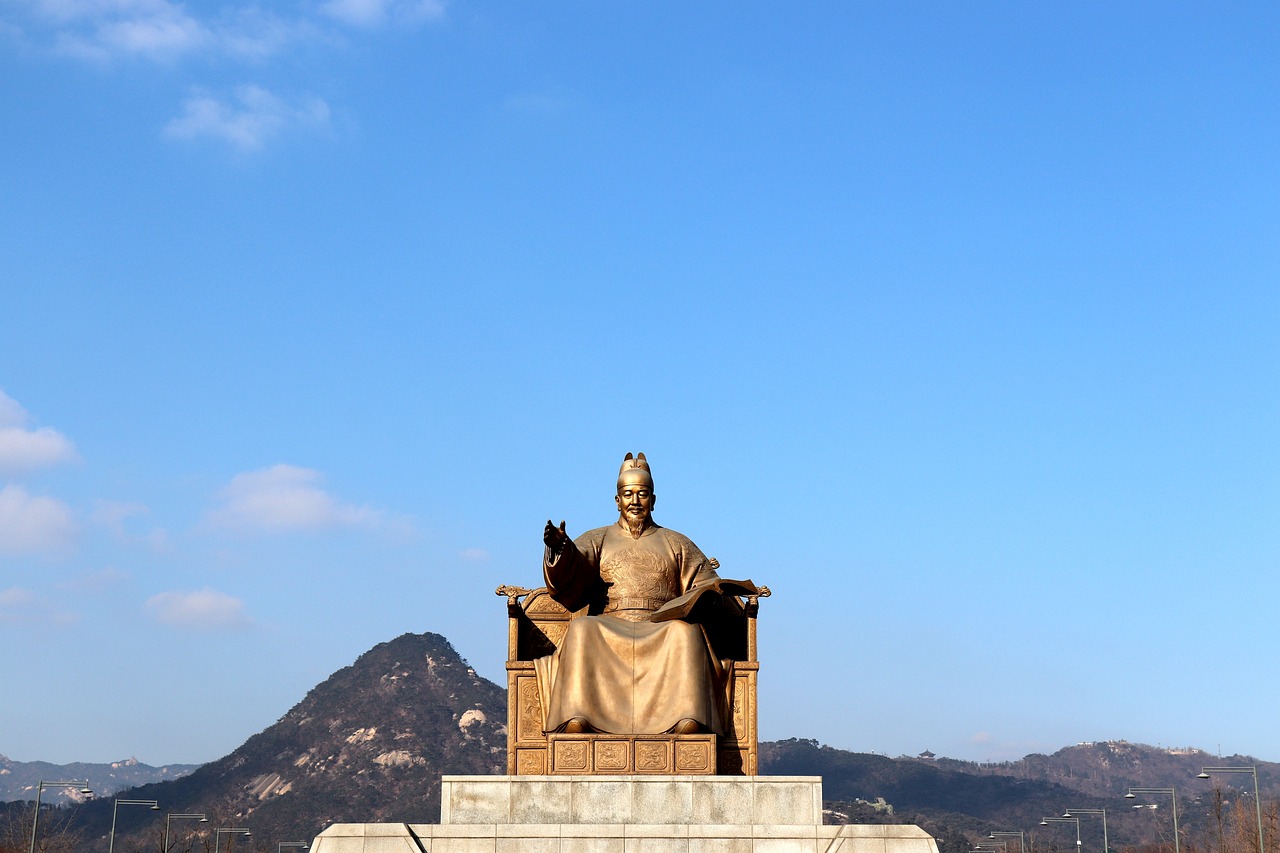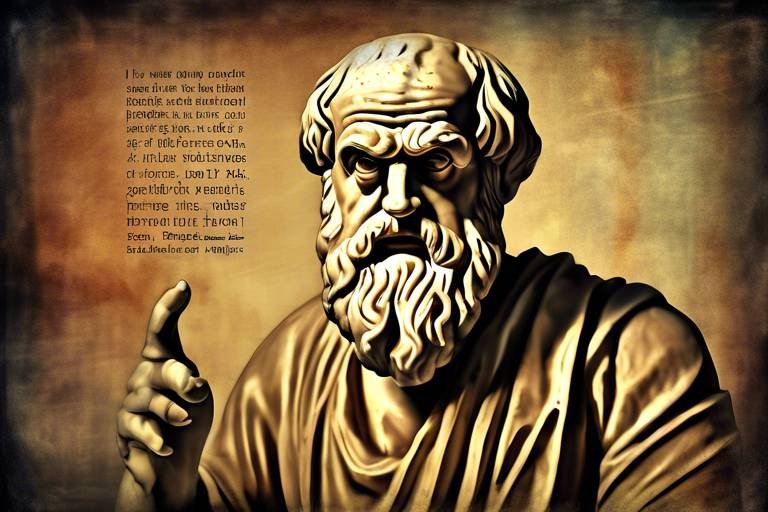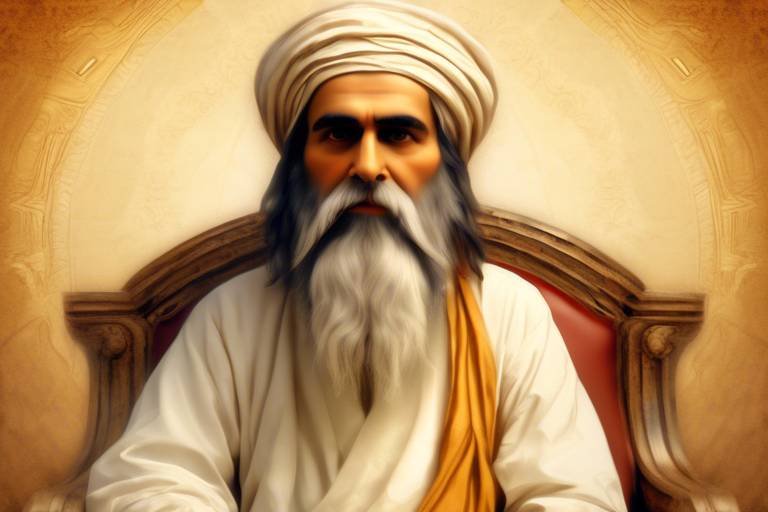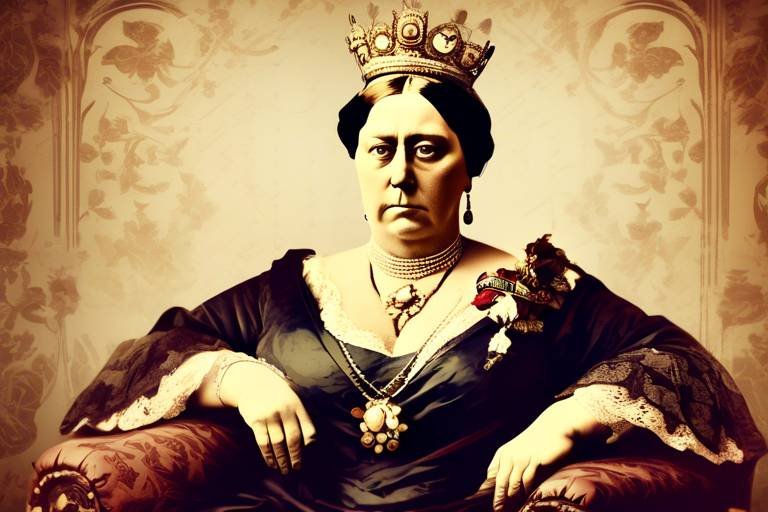King Solomon: The Wise Ruler of Israel
King Solomon, the wise ruler of Israel, stands out in history for his exceptional leadership and profound wisdom that guided the ancient kingdom to unprecedented prosperity and cultural flourishing. Known as a figure of great sagacity and astuteness, King Solomon's reign left an indelible mark on the annals of Israel's history.
Ascending to the throne of Israel following the reign of his father, King David, Solomon's early life was marked by a rich tapestry of experiences that shaped his character and prepared him for the challenges of rulership. His upbringing and education laid the foundation for the wise decisions and strategic governance that would define his reign.
One of the most remarkable achievements of King Solomon's reign was the construction of the magnificent Temple of Jerusalem. This architectural masterpiece not only symbolized his dedication to religious worship but also showcased his visionary leadership in overseeing grand projects that enhanced the kingdom's prestige.
Renowned for his wisdom and commitment to justice, King Solomon's legacy is epitomized by the famous judgment involving two women claiming the same child. His discerning judgment in this case exemplified his ability to navigate complex moral dilemmas with fairness and insight.
King Solomon's prowess in diplomacy and trade played a pivotal role in Israel's economic prosperity and influence on the international stage. His successful alliances with neighboring kingdoms and strategic trade agreements bolstered the kingdom's wealth and secured its position as a regional powerhouse.
Delving into the poetic and romantic side of King Solomon, the biblical book known as the Song of Solomon offers a glimpse into his deep emotions and profound expressions of love. This intimate portrayal adds a layer of complexity to his character, revealing a multifaceted ruler beyond his political acumen.
Despite his many triumphs, King Solomon faced significant challenges during his reign, leading to internal strife and the eventual division of the kingdom after his death. These trials underscored the complexities of governance and the fragility of power, serving as cautionary tales for future generations.
The enduring legacy of King Solomon continues to shape Israel's history, culture, and religious practices, leaving an indelible imprint on the nation's identity for centuries to come. His reign remains a pivotal era that defined the trajectory of the kingdom and influenced generations of leaders and thinkers.
Comparing the historical accounts of King Solomon's reign with the biblical narratives offers a nuanced perspective on his complex legacy as a ruler and figure of wisdom. The convergence of historical records and religious texts sheds light on the multifaceted nature of his rule and the enduring impact of his wisdom on subsequent generations.

Early Life and Ascension to the Throne
King Solomon, a prominent figure in ancient Israel's history, is renowned for his exceptional wisdom and leadership skills that guided the kingdom to prosperity and cultural advancement. Let's delve into the life and reign of this legendary ruler to uncover the legacy he left behind.
King Solomon's journey to kingship began with his upbringing under the tutelage of his father, the esteemed King David. Raised in a royal environment, he received a comprehensive education that honed his intellect and prepared him for future challenges. As fate would have it, upon King David's passing, Solomon ascended to the throne of Israel, inheriting the responsibilities of rulership and the weight of a nation's expectations.

Building the Temple of Jerusalem
King Solomon's most notable achievement, among many, was the construction of the grand Temple of Jerusalem. This monumental project, overseen by the wise ruler himself, symbolized his deep commitment to religious worship and his remarkable architectural skills. The Temple stood as a testament to the glory of Israel and a focal point for spiritual practices.
Imagine the meticulous planning and intricate design that went into creating such a sacred structure. The Temple of Jerusalem was not just a building; it was a representation of King Solomon's reverence for God and his desire to provide a place of worship for the people of Israel. Every stone laid was a testament to the king's dedication to his faith and his people.
Moreover, the construction of the Temple served as a unifying force for the nation. It brought together skilled artisans, laborers, and resources from across the kingdom, showcasing King Solomon's ability to rally his people towards a common goal. The project not only enhanced the cultural significance of Jerusalem but also solidified the city's position as the heart of Israel.
As the Temple of Jerusalem rose from the ground, it became a beacon of hope and prosperity for the kingdom. Its magnificence and splendor attracted visitors from far and wide, further elevating Israel's reputation on the international stage. King Solomon's vision and leadership were on full display as the Temple transformed into a symbol of divine presence and national pride.

Wisdom and Justice
King Solomon was not only known for his great wisdom but also for his remarkable sense of justice. One of the most famous stories illustrating his wisdom and fairness is the tale of the two women who came to him with a baby, each claiming to be the mother. Instead of making a hasty decision, Solomon devised a clever test to determine the true mother. By suggesting to cut the baby in half and split it between the women, he revealed the real mother who selflessly offered to give up the child to save its life. This demonstration of Solomon's wisdom in uncovering the truth and his compassion in ensuring justice left a lasting impression on his people.

Trade and Diplomacy
King Solomon's reign was not only characterized by wisdom and justice but also by his adeptness in trade and diplomacy. His strategic alliances and trade agreements with neighboring kingdoms played a pivotal role in the economic prosperity and influence of Israel during his rule. Through shrewd negotiation and diplomatic finesse, King Solomon established strong relationships with key trading partners, fostering a climate of mutual benefit and growth.
One of the most renowned trade partnerships was with the Queen of Sheba, who visited Solomon to witness his wisdom and wealth firsthand. This encounter not only solidified their diplomatic ties but also opened up new avenues for trade and cultural exchange between their respective kingdoms. The exotic goods and resources that flowed into Israel enriched the kingdom's markets and elevated its status as a hub of commerce in the region.
Moreover, King Solomon's keen understanding of international relations enabled him to navigate complex political landscapes with finesse. By forging alliances through marriage alliances and treaties, he secured peace and stability for Israel, safeguarding the kingdom against external threats and conflicts. His diplomatic acumen was instrumental in maintaining a harmonious balance of power in the region, ensuring the prosperity and security of his realm.
Furthermore, King Solomon's commitment to fair trade practices and equitable agreements set a precedent for ethical commerce that resonated throughout the ancient world. Merchants and traders from far and wide sought to engage in business with Israel due to the reputation of integrity and reliability established by Solomon's administration. This reputation not only boosted the kingdom's economy but also enhanced its standing as a trustworthy partner in the global marketplace.

The Song of Solomon
The Song of Solomon, also known as the Song of Songs, is a poetic and romantic book in the Bible that portrays the deep love and devotion between King Solomon and his beloved. This collection of lyrical verses is rich in metaphor and allegory, symbolizing the passionate relationship between two lovers. It is often interpreted not only as a celebration of human love but also as an allegory of the divine love between God and his people.
The imagery used in the Song of Solomon is vivid and evocative, painting a picture of love's beauty and intensity. The book explores themes of desire, longing, and the power of love to overcome obstacles. Through its lyrical language and sensual descriptions, the Song of Solomon captures the essence of romantic love in all its complexity and depth.
Many scholars and readers have debated the exact interpretation of the Song of Solomon, with some viewing it as a straightforward celebration of human love and others interpreting it as an allegory of the relationship between Christ and the Church. Regardless of its precise meaning, the book stands as a testament to the enduring power of love and the beauty of intimate relationships.
The Song of Solomon is a unique and intriguing addition to the biblical canon, offering a glimpse into the personal and emotional life of King Solomon. Its poetic language and profound themes continue to captivate readers and inspire reflection on the nature of love and devotion. As one of the most poetic and enigmatic books in the Bible, the Song of Solomon remains a timeless exploration of the complexities of human relationships and the enduring power of love.

Challenges and Downfall
Exploring the life and reign of King Solomon, known for his wisdom and leadership in ancient Israel, and his significant contributions to the kingdom's prosperity and cultural development.
King Solomon, despite his wisdom and accomplishments, faced various challenges during his reign that ultimately led to his downfall. One of the significant challenges he encountered was the strain on the kingdom's resources due to the extensive building projects he undertook, including the construction of the Temple of Jerusalem. The immense cost and labor required for these projects put a strain on the economy and the people of Israel, leading to discontent among the population.
Additionally, King Solomon's diplomatic efforts, while successful in establishing trade relations with neighboring kingdoms, also brought about challenges. His alliances through marriage with foreign princesses, meant to secure peace and strengthen ties, introduced foreign influences and religions into Israel, causing divisions and tensions among the people.
Furthermore, towards the later years of his reign, King Solomon's administration faced internal strife and opposition from within his court. The widespread dissatisfaction with his policies and the heavy taxation imposed to support his lavish lifestyle led to growing unrest among the populace and the nobility.
Ultimately, these internal conflicts and external pressures culminated in the division of the kingdom of Israel after King Solomon's death. The once united and prosperous nation was split into two separate entities, marking the end of an era of unparalleled glory and wisdom under his rule.
1. Was King Solomon the son of King David?
Yes, King Solomon was the son of King David and Bathsheba, succeeding his father as the ruler of Israel.
2. What is King Solomon most famous for?
King Solomon is most famous for his wisdom, as depicted in the Bible, and for the construction of the Temple of Jerusalem.
3. How did King Solomon's reign end?
King Solomon's reign ended with the division of the kingdom of Israel into two separate entities after his death, following a period of internal strife and challenges.

Legacy and Influence
King Solomon's legacy and influence on Israel's history and culture are profound and enduring. His reign as a wise and prosperous ruler left a lasting impact on the nation, shaping its identity for generations to come. Through his leadership, Israel experienced a period of unprecedented growth and prosperity, establishing the kingdom as a prominent power in the region.
One of the most significant aspects of King Solomon's legacy is his contribution to Israel's religious practices. His construction of the Temple of Jerusalem not only demonstrated his dedication to religious worship but also solidified Jerusalem as the spiritual center of the kingdom. The temple became a symbol of divine presence and a focal point for religious ceremonies, drawing worshippers from far and wide.
In addition to his religious influence, King Solomon's wisdom and justice left a profound mark on Israelite society. His renowned judgment in the case of the two women claiming the same child exemplified his discernment and fairness, earning him the respect and admiration of his subjects. His commitment to upholding justice and righteousness set a standard for future rulers to follow.
Furthermore, King Solomon's diplomatic prowess and trade agreements with neighboring kingdoms significantly boosted Israel's economic prosperity and influence on the international stage. His ability to form alliances and establish lucrative trade routes brought wealth and stability to the kingdom, fostering a period of unprecedented growth and cultural exchange.
Despite facing challenges and internal strife towards the end of his reign, King Solomon's legacy as a wise and visionary leader endures in the annals of history. His contributions to Israel's cultural and religious heritage continue to resonate with people around the world, inspiring reverence and admiration for his wisdom and achievements.

Historical and Biblical Perspectives
When delving into the life and legacy of King Solomon, it is essential to consider the historical and biblical perspectives that shape our understanding of this legendary ruler. From a historical viewpoint, King Solomon is often depicted as a wise and prosperous monarch who oversaw a period of great affluence and cultural flourishing in ancient Israel. His renowned wisdom, as evidenced by the famous judgment involving the two women and the child, has been a subject of admiration and study for centuries.
On the other hand, biblical accounts offer a more nuanced portrayal of King Solomon, highlighting not only his wisdom and achievements but also his flaws and shortcomings. The Bible portrays him as a complex figure, grappling with temptations and ultimately facing consequences for his actions. The narrative of his reign serves as a cautionary tale, illustrating the dangers of straying from the path of righteousness and succumbing to worldly desires.
Comparing these two perspectives, we are presented with a multifaceted image of King Solomon, blending historical facts with moral lessons and spiritual insights. The juxtaposition of the historical and biblical narratives invites us to ponder the complexities of human nature and the enduring relevance of ancient wisdom in our modern world.
Frequently Asked Questions
- Who was King Solomon?
King Solomon was a biblical figure known for his wisdom and reign as the ruler of Israel. He was the son of King David and is often remembered for his contributions to the prosperity and cultural development of the kingdom.
- What is King Solomon most famous for?
King Solomon is most famous for his wisdom, as demonstrated in the well-known story of his judgment involving two women claiming the same child. He is also recognized for building the Temple of Jerusalem and his successful trade and diplomatic relations.
- What were some of King Solomon's achievements?
Some of King Solomon's notable achievements include the construction of the Temple of Jerusalem, his wise judgments, the Song of Solomon, and his establishment of trade agreements that contributed to Israel's economic prosperity.
- Did King Solomon face any challenges during his reign?
Yes, King Solomon faced challenges during his reign, including internal strife and the eventual division of the kingdom after his death. Despite his wisdom and accomplishments, he also experienced trials and tribulations.
- What is King Solomon's legacy?
King Solomon's legacy includes his lasting impact on Israel's history, culture, and religious practices. His rule shaped the nation's identity for generations to come, leaving behind a complex legacy as a ruler and figure of wisdom.



















